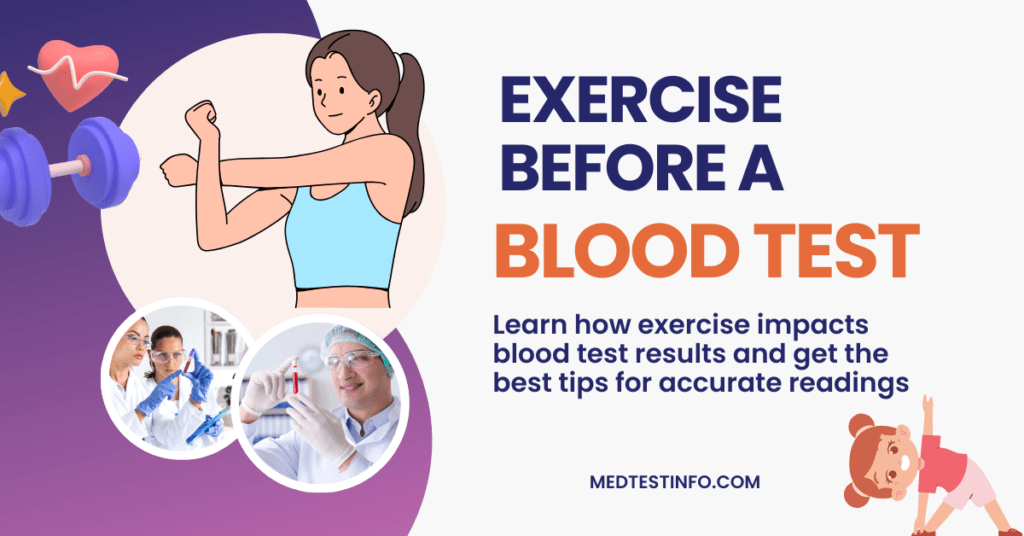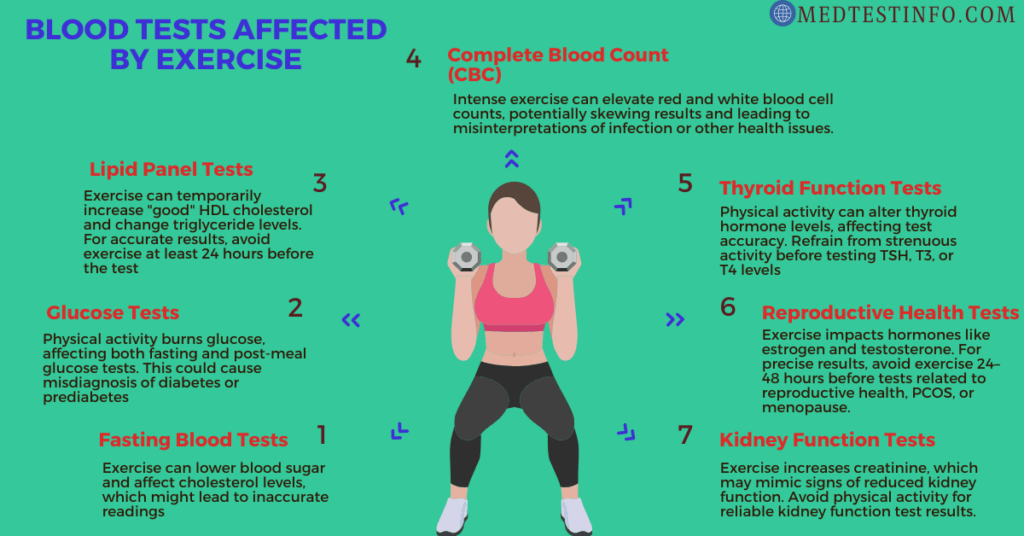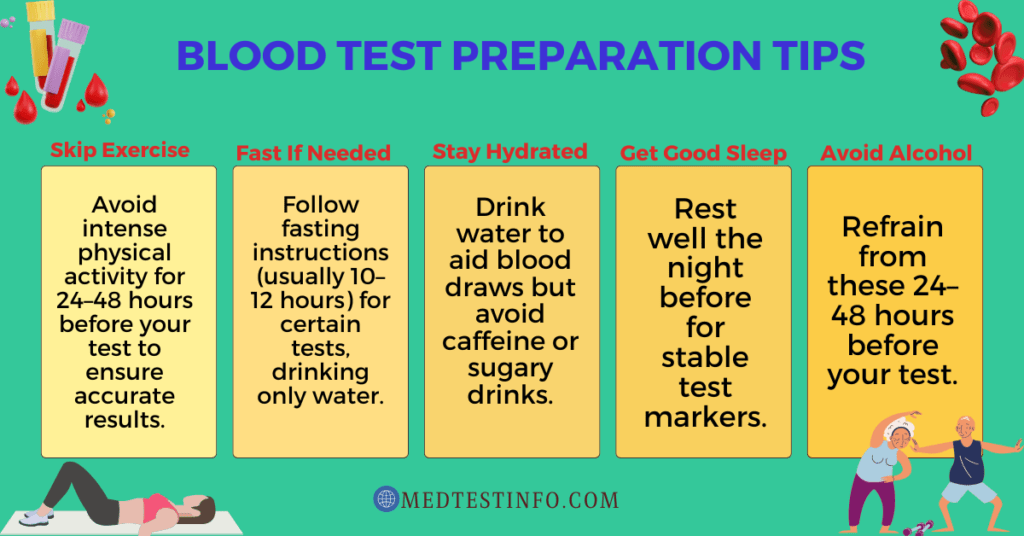
Overview
Many individuals wonder about the influence of exercise on blood test results. Understanding this impact can empower you to ensure accuracy and avoid unnecessary complications. Knowing how exercise affects the findings is crucial, whether it’s a routine cholesterol test, a glucose level check, or another critical blood test.
For many blood tests, especially fasting tests, the general advice is to refrain from vigorous activity before the blood draw. Even mild activities like walking or moderate exercises can influence specific biomarkers. These changes, which can vary from person to person, may impact the interpretation of your blood test results and, consequently, medical decisions. Therefore, it’s essential to understand the specific requirements of your test.
So, why is exercise important? Some assays, such as glucose and cholesterol, rely on a baseline value, often impacted by fasting and rest. When you exercise before a blood test, your cortisol, adrenaline, and even glucose levels may briefly rise. These hormones and glucose are essential indicators of your body’s stress response and energy levels, and their temporary increase due to exercise can affect the accuracy of your blood test results. Knowing whether or not to engage in physical activity and how to prepare for a blood test might help you get accurate results that represent your health state.
In this post, we’ll go over everything you need to know about exercising before a blood test, including which types of blood tests are most susceptible to physical activity, how long you should rest after exercise, and best practices for getting reliable results.
Why Exercise Can Affect Blood Test Results
Exercise can significantly impact numerous blood components, so it’s essential to understand how it may affect your results before a test. When you exercise, your body undergoes a series of physiological changes that influence your blood composition, sometimes in ways that can interfere with the accuracy of specific tests.
Hormonal And Chemical Changes
One primary reason exercising before a blood test can affect findings is the rise in hormones and chemicals during and after physical activity. For example, strenuous exercise raises cortisol levels, a stress hormone that can influence a variety of stress, metabolic, and immune function tests. Furthermore, adrenaline levels rise during exercise, which may increase your heart rate and affect your blood pressure measurements. This can provide biased results in testing for heart function, blood pressure, and overall stress levels.
Glucose And Insulin Sensitivity
Exercise, especially aerobic activity, can influence glucose metabolism. Exercise before a glucose test can lower your blood sugar level because it causes your muscles to absorb glucose from the bloodstream for energy. This may result in a falsely low result, leading to misinterpretation if you are being tested for diabetes or insulin resistance. To ensure the findings accurately represent your baseline glucose levels, avoid exercising when taking a fasting blood sugar test or a fasting blood test that checks additional indicators.
Lipid And Cholesterol Levels
Exercising before a cholesterol blood test can temporarily affect lipid levels. Your body’s fat distribution in the bloodstream may change during and after exercise. These changes may lead blood tests after exercise to indicate slightly altered cholesterol levels, which may differ from what you would expect if rested. Many studies have found that vigorous exercise can temporarily raise HDL cholesterol (the “good” cholesterol), although the effect varies depending on the intensity and length of the workout.
Red And White Blood Cells
Intense physical activity can also impact red and white blood cell counts, which may be necessary for a complete blood count (CBC) test. After severe exercise, your blood volume may fluctuate, resulting in a temporary rise in red blood cells. Similarly, white blood cells, which indicate immune system activity, might increase during severe exercise as a natural response to physical stress. This can alter the outcome of blood tests that measure inflammation or immunological function, perhaps leading to incorrect conclusions.
Hydration And Electrolytes
Hydration is essential for blood test results, and exercise can significantly impact it. After a workout, hydration levels may decline, resulting in concentrated blood samples that alter test results. Dehydration can also result in artificially inflated values in specific tests, such as kidney function tests, due to increased levels of waste products such as creatinine and urea.
Impact On Other Specialized Tests
Exercise can sometimes interfere with more specific blood tests, such as thyroid or reproductive hormone testing. Exercise can produce changes in hormone release, such as testosterone and estrogen, which might skew test results used to diagnose hormonal imbalances or reproductive health concerns.

Blood Tests Affected By Exercise
Understanding the impact of exercise on blood tests is crucial. Knowing which tests require you to stop exercising before having your blood drawn empowers you to take control of your health. In this section, we will explore some of the most common blood tests that can be altered by exercise and why it is vital to avoid physical activity in these situations.
Fasting Blood Tests
Fasting blood tests are among the most common tests for avoiding activity. They assess baseline levels of several chemicals in the blood, such as glucose, cholesterol, and triglycerides, and usually require a fasting period prior to the test. Exercise before a fasting blood test can substantially impact your findings by reducing blood sugar levels and affecting lipid profiles.
For instance, exercising before a glucose test can lead to lower-than-expected blood glucose levels, potentially resulting in a misinterpretation that you are not at risk for conditions like diabetes or hypoglycemia. Similarly, exercise can cause fluctuations in cholesterol levels, making your cholesterol test results appear better than they are.
Glucose Tests (fasting and postprandial)
Exercise directly affects glucose levels since it burns glucose for energy. You should avoid exercise when preparing for a fasting blood test to measure your blood sugar or an oral glucose tolerance test (OGTT). Physical effort can cause a glucose test to produce less-than-accurate results, potentially leading to misdiagnosis or delays in detecting conditions such as diabetes or prediabetes.
Even after a meal, exercising before a fasting blood test may interfere with glucose metabolism, influencing how your body manages blood sugar after eating. To ensure the most accurate and dependable results, it’s crucial to prioritize your health and refrain from exercise before a glucose test.
Cholesterol And Lipid Panel Tests
If you have a cholesterol blood test, exercise can induce variations in your lipid levels, notably HDL (good cholesterol) and LDL (bad cholesterol). Physical activity can temporarily raise HDL cholesterol, resulting in an overestimation of your “good” cholesterol levels. Triglyceride levels can be affected by exercise, particularly after a vigorous workout.
As a result, it is critical to avoid exercising before undergoing blood work for a cholesterol panel. To receive the most accurate lipid findings, you should wait at least 24 hours before having your blood drawn for this sort of test.
Complete Blood Count (CBC)
A complete blood count (CBC) is a routine test that assesses overall health and detects many problems, including anaemia, infection, and other diseases. Exercise, particularly strong or prolonged exertion, can affect red and white blood cell levels. Following a workout, your red blood cell count may briefly increase as your body compensates for the increased oxygen demand, potentially leading to an erroneous CBC result.
Exercise can also boost white blood cell numbers because the immune system reacts to physical stress. If activity is not considered during test preparation, this rise may be misinterpreted as an infection or other health problem.
Thyroid Function Tests
Exercise before thyroid blood tests may produce changes in thyroid hormone secretion. Exercise before a thyroid test may cause temporary elevation or suppression of hormone levels, altering the test’s accuracy. If you are testing for thyroid function (e.g., TSH, T3, and T4 levels), you should avoid strenuous physical activity before the test.
Changes in thyroid hormone levels can impact your metabolism, energy, and overall health. Exercise should be avoided before blood work for thyroid testing to ensure an accurate readout, especially if you are undergoing a complete panel for thyroid dysfunction.
Hormonal And Reproductive Health Tests
Exercise can alter hormones, including testosterone, estrogen, and progesterone, all necessary for reproductive health. Exercise before hormonal blood tests can cause hormone levels to fluctuate, resulting in erroneous readings, mainly if you are being tested for polycystic ovarian syndrome (PCOS), menopause, or fertility concerns.
Women who exercise before blood work that detects reproductive hormones such as estrogen or progesterone may experience transitory increases or drops in hormone levels, making it difficult to determine the actual state of their reproductive health. To ensure accurate test results, avoid exercising 24 to 48 hours before these types of testing.
Kidney Function Tests
Exercise can also influence kidney function tests, which evaluate creatinine and blood urea nitrogen (BUN) indicators. When you exercise strenuously, your muscles release creatinine, a waste product of muscular metabolism, into your bloodstream. This transient increase in creatinine levels may give the impression that renal function is impaired.
Before performing a kidney function blood test, it is critical to avoid physical activity to ensure reliable findings. Refraining from exercise will help guarantee that your results accurately represent your kidney health.

How To Prepare For A Blood Test
Preparing for a blood test is critical to ensuring the findings are correct and reflect your current health status. Here are some essential actions you may take to prepare properly:
Avoid Exercising Before The Blood Test
If you intend to obtain a blood test after exercise, be sure you have given your body enough time to recover. As previously noted, exercising before a blood test can affect a variety of blood indicators, including glucose, cholesterol, and red blood cell counts. Avoid excessive physical activity for 24-48 hours before your test to ensure the most accurate results.
Follow Fasting Guidelines (if necessary)
Many blood tests require you to fast for a specific amount, typically 10-12 hours, to guarantee that food and drink do not interfere with the results. Make sure to follow these directions strictly. Fasting before a blood test entails avoiding food, beverages (other than water), and even chewing gum. If you are having a fasting blood test, make sure to schedule it early in the morning to make it simpler to follow the fasting period.
Stay Hydrated
Staying hydrated before your test is critical because dehydration can reduce blood volume and make it more difficult to draw blood. Drink plenty of water before your blood test to keep your veins healthy and easily accessible. However, avoid caffeinated and sugary beverages, which may interfere with your results.
Get Adequate Rest
Make sure you got a decent night’s sleep before your test. Fatigue or stress might skew specific blood markers, such as cortisol levels, influencing the outcome. Resting the night before guarantees your body is stable and prepared for accurate tests.
Avoid Alcohol And Caffeine
Both alcohol and coffee might briefly affect your blood test results, mainly glucose and cholesterol panels. To guarantee the most accurate results, avoid these substances 24–48 hours before your blood test.
Inform Your Doctor About Medications
Certain medications can alter your blood test results, so tell your doctor about any prescription or over-the-counter medications you are taking. In rare situations, you may be instructed to temporarily discontinue specific drugs before the test.
Conclusion
Exercise before blood tests can significantly impact the accuracy of your results. Therefore, you should carefully examine your activity level before taking the test. Avoiding strenuous exercise, following fasting rules, staying hydrated, and getting adequate rest will guarantee that your blood test results are as accurate as possible. Allow time for recovery following a blood draw before returning to physical activities.
By following these guidelines, you may help guarantee that your blood test results provide the most accurate and valuable insights into your health. This will allow you and your doctor to make informed decisions about your treatment.
Frequently Asked Questions (FAQs)
Yes, you can work out before a blood test, but you should understand how it will affect your findings. Exercising before a blood test might produce transitory changes in some markers, such as blood sugar, cholesterol, and hormone levels. To guarantee reliable results, avoiding vigorous physical activity for at least 24-48 hours before the test is typically recommended, particularly for tests like glucose or cholesterol panels. If unsure, please check with your doctor about any limits before your blood test.
It is usually recommended to wait before exercising after a blood sample. After blood is drawn, your body requires time to recuperate. Strenuous exercise following a blood test may cause weariness or dizziness. If you feel fine following the surgery, start with modest activities like walking, but avoid high-intensity workouts until you completely recover.
Walking before a blood test usually has no meaningful effect on your findings unless the test is particular (such as assessing cardiac indicators). Light walking or stretching should not affect most blood tests, but avoiding excessive physical activity before the test is still best. Always check with your healthcare practitioner to ensure that your physical activity does not alter the accuracy of your results.
Before getting your blood drawn, make sure to follow your healthcare provider’s instructions. This could involve fasting, staying hydrated, and avoiding specific medications or activities. If the test requires fasting, avoid eating or drinking (except water) for the specified time. If you intend to exercise before a blood test, avoid excessive activity for 24-48 hours to ensure reliable findings.
As previously stated, light or moderate exercise should not interfere with most blood tests, but severe activity can skew results, particularly for tests involving glucose, cholesterol, or liver function. If you are concerned, avoiding working out before a blood test is best to ensure a more accurate result.
After blood draws, you can resume your regular activities when ready. However, strenuous exertion immediately following a blood test may cause dizziness, fainting, or extreme exhaustion. Listen to your body and gradually return to a training plan, beginning with low-impact exercises if you feel comfortable.


